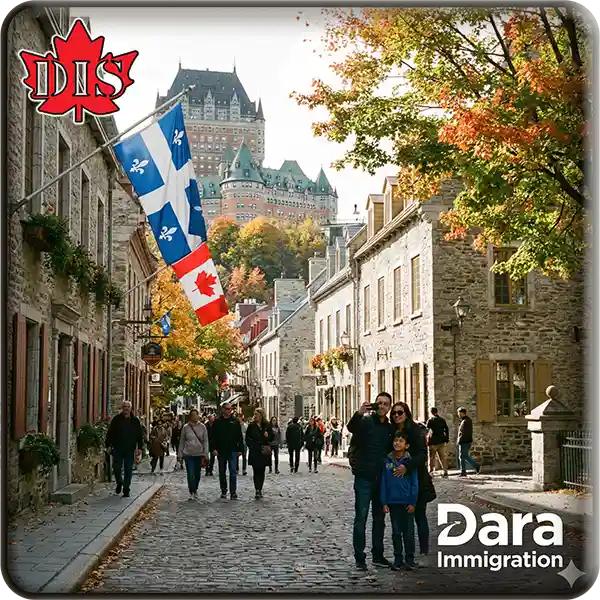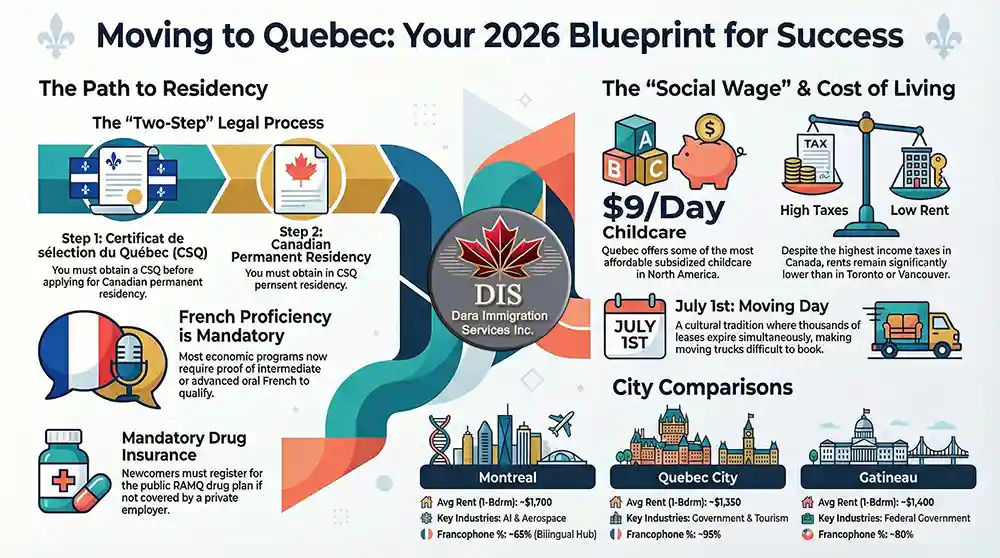Quebec
Quebec Overview 2026-2027
To choose Quebec is to choose a life that feels more European than North American. As the only predominantly French-speaking province in Canada, it offers a distinct culture, affordable childcare, and some of the lowest tuition rates in the country. For the thousands of newcomers arriving in 2026, this province represents a unique opportunity to live in a vibrant, affordable society—provided you are willing to embrace the French language.

However, moving to Quebec is legally distinct from moving anywhere else in Canada. The province has full control over its economic immigration intake. You do not apply directly to Canada; you apply to Quebec first for a Certificat de sélection du Québec (CSQ). Without this document, your journey cannot begin.
At Dara Immigration Services, we specialize in the complex “two-step” immigration process required for Quebec. This guide is your blueprint to settling in this province successfully, ensuring your move is culturally enriching and legally secure.
Economy & Lifestyle
Quebec is the second-most populous province in Canada and a powerhouse in aerospace, artificial intelligence, and hydroelectricity. Unlike the “English Canada” provinces, this province puts cultural preservation at the heart of its policies.
For immigrants, the most critical factor is Language. Under recent laws (Bill 96), access to government services in English is limited, and most economic immigration programs now require proof of intermediate or advanced oral French. However, for those who speak the language, the competition is significantly lower than in Ontario or BC.
Quick Facts: Quebec at a Glance
- Capital City: Quebec City.
- Largest City: Montreal (Population ~4.4 Million in Metro).
- Population: Approx. 9 Million (2026 Estimate).
- Taxation: 14.975% Combined Sales Tax (GST + QST).
- Key Immigration Document: Certificat de sélection du Québec (CSQ).
- Minimum Wage: $15.75+ per hour (Indexed).
- Key Benefit: Subsidized Child Care (approx. $9/day).
Cities & Economic Zones
To succeed in this province, you must decide between the cosmopolitan metropolis, the historic capital, or the growing regions.
Montreal
The economic engine of the province, Montreal is famous for its festivals, universities, and affordable urban living.
Economy & Labour Market
- Key Industries: Aerospace (Bombardier/Airbus), Artificial Intelligence (Mila Institute), and Video Games (Ubisoft).
- Employment Outlook: High demand for IT professionals and engineers. While many international companies operate in English, speaking French is virtually essential for long-term career growth.
- Lifestyle & Culture: Vibrant and artistic. Montreal has a “joie de vivre” (joy of living) that is unmatched, with world-class dining and nightlife.
- Cost of Living: Moderate. While rising, Montreal remains the cheapest major city in Canada. One-bedroom rents average $1,700, compared to $2,600+ in Toronto.
Quebec City
The provincial capital is the heart of French culture in North America and a hub for government administration.
Economy & Labour Market
- Key Industries: Public Administration (Provincial Government), Insurance (Desjardins), and Tourism.
- Employment Outlook: Severe labour shortages. The unemployment rate is often below 3%. Employers are desperate for workers, but fluency in French is non-negotiable.
- Lifestyle & Culture: Historic and safe. The city feels like a fortified European town. It is incredibly safe and family-oriented, with a slower pace than Montreal.
- Cost of Living: Affordable. You can find high-quality rentals for $1,200 – $1,400, and home ownership is very accessible for middle-class families.
Gatineau
Located directly across the river from Ottawa, Gatineau offers a unique strategic advantage.
Economy & Labour Market
- Key Industries: Federal Government and Construction.
- Employment Outlook: Many residents live in Gatineau for the cheap rent but work in Ottawa (Ontario) for the higher salaries.
- Lifestyle: Suburban and green. It offers easy access to the Gatineau Hills for skiing and hiking.
- Cost of Living: Very Low. Rents are significantly cheaper than on the Ottawa side of the river, though income taxes are higher.
Cost of Living & Climate (2026)
Use this table to understand the financial trade-offs of La Belle Province.
| City / Region | Avg Rent (1-Bdrm) | Key Industry | Climate (Jan) | Francophone % |
| Montreal | ~$1,700 | AI / Aerospace | -9°C | ~65% (Bilingual Hub) |
| Quebec City | ~$1,350 | Gov / Tourism | -12°C | ~95% |
| Gatineau | ~$1,400 | Federal Gov | -10°C | ~80% |
| Sherbrooke | ~$1,100 | Education | -11°C | ~90% |
| Trois-Rivières | ~$1,000 | Manufacturing | -11°C | ~96% |
Note: Winters in this province are snowy and cold. A high-quality winter coat and boots are mandatory investments.
“How-To” Guide: Settling in Quebec
Your transition to Quebec involves a completely different set of government agencies than the rest of Canada.
Pre-Arrival: The “Two-Step” Process
- Apply for CAQ/CSQ: If you are a student, you need a Certificat d’acceptation du Québec (CAQ). If you are a worker seeking PR, you eventually need a Certificat de sélection du Québec (CSQ).
- Learn French: Start now. Your ability to integrate and pass immigration interviews depends entirely on your French proficiency.
Your First Week: Essential Setup
- Register for RAMQ: Visit the Régie de l’assurance maladie du Québec (RAMQ) to apply for your health card. Note: There is a waiting period for most newcomers (up to 3 months), though some countries (like France) have reciprocal agreements.
- Drug Insurance: In this province, prescription drug insurance is mandatory. If your employer does not offer a private plan, you must register for the public RAMQ drug plan.
Long-Term: Integration
- Francisation: The government offers free French courses (Francisation). Sign up immediately. They often pay you a small allowance to attend.
- Lease Signing: Quebec leases renew automatically. You must give notice 3-6 months in advance if you plan to leave July 1st (Moving Day).
Challenges for Newcomers in Quebec
To succeed in Quebec, you must be realistic about taxes and language.
Challenge #1: The Language Barrier
- The Reality: Outside of downtown Montreal, daily life happens in French. Contracts, road signs, and schooling for your children (unless you meet specific exemptions) will be in French.
- The Strategy: Do not fight it. Embrace the language as a skill that unlocks the culture. View it as a career asset, not a hurdle.
Challenge #2: Highest Taxes in North America
- The Reality: This province has the highest income tax rates in Canada. A salary of $100,000 yields less take-home pay here than in Ontario.
- The Strategy: Focus on what you get in return: $9/day childcare, cheap tuition, and lower rent. The “social wage” in this province is high, even if the “cash wage” is taxed heavily.
Frequently Asked Questions (FAQ)
- Can I immigrate to Quebec without speaking French?
It is becoming nearly impossible. Recent changes to the Programme de l’expérience québécoise (PEQ) and the Regular Skilled Worker Program require oral French proficiency for the principal applicant (and often the spouse).
- What is the “CSQ”?
The Certificat de sélection du Québec is a document issued by the province declaring that you have been selected to settle there. Once you have a CSQ, the federal government (IRCC) generally only checks your medical and criminal admissibility.
- Is healthcare free in Quebec?
Yes, doctor and hospital visits are covered by RAMQ. However, you must pay for a mandatory prescription drug plan (either private or public), which costs an annual premium.
- Why is July 1st “Moving Day”?
It is a cultural tradition. Most residential leases in this province end on June 30th. On July 1st, thousands of people move simultaneously. Booking a moving truck for this date is extremely difficult and expensive.
- Are taxes really that high?
Yes. You pay federal GST (5%) plus provincial QST (9.975%) on almost everything, totaling nearly 15%. Income taxes are also progressive and steep. However, auto insurance and childcare are significantly cheaper than elsewhere.

Professional Immigration Assistance
Quebec operates its own immigration ministry (MIFI) with its own rules, quotas, and portals (Arrima). A mistake on a federal form is bad; a mistake on a Quebec form can delay your project by years because the two systems do not always talk to each other.
Ensure your “Quebec Project” is built on a solid legal foundation. Contact Dara Immigration Services today for a specialized consultation.
Disclaimer: This article provides general information regarding settlement and immigration in Quebec. It does not constitute legal advice.
Download:
Download the bulletin of Quebec as a PDF.
Download “Quebec-Bulletin-2026-2027.pdf” Quebec-Bulletin-2026-2027.pdf – Downloaded 59 times – 1.90 MB